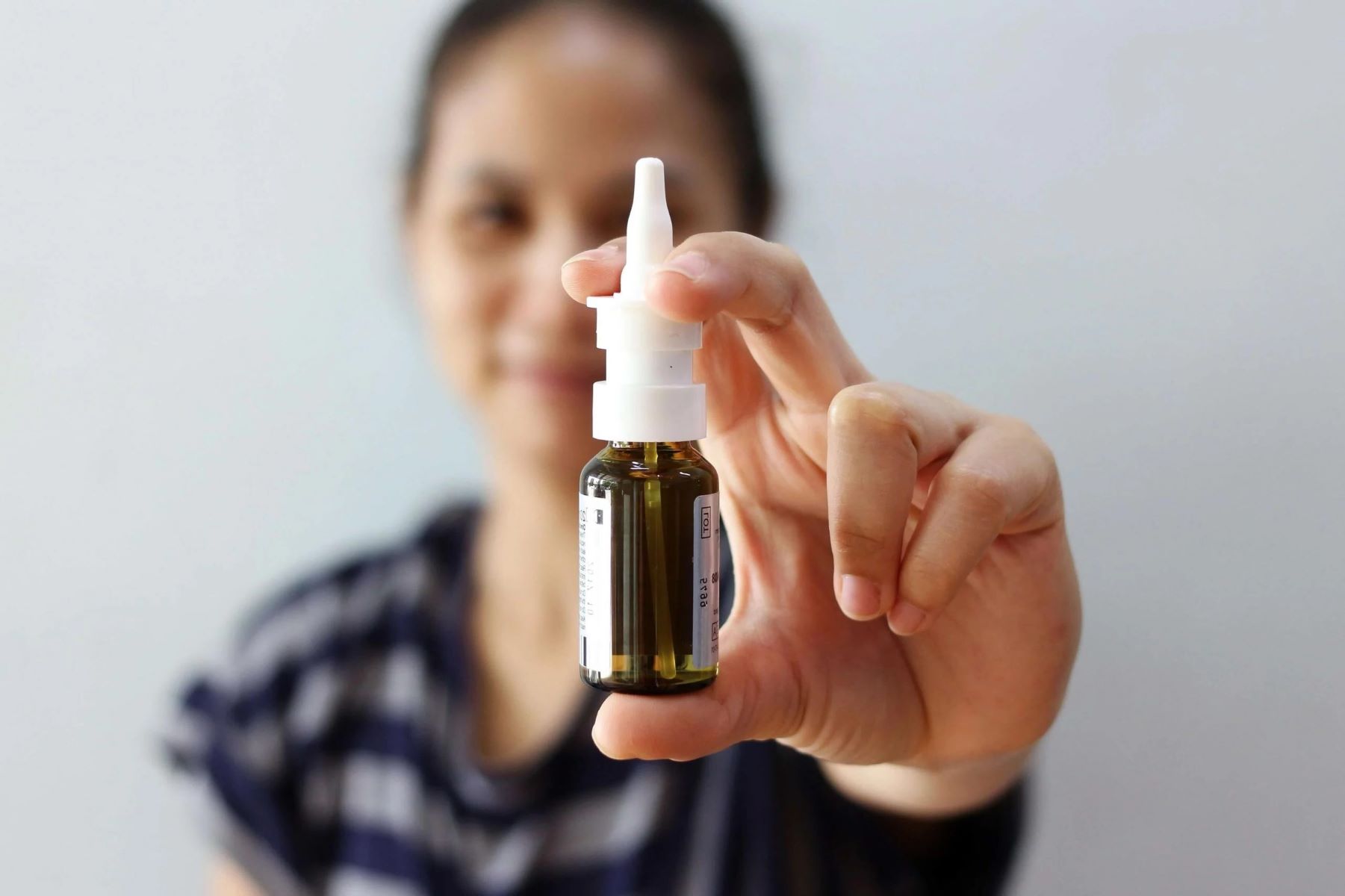
Can nasal sprays help in the fight against COVID-19? Yes, nasal sprays have shown promise in preventing and treating COVID-19. These sprays offer a convenient, needle-free method to deliver drugs directly to the nasal cavity, the primary site of SARS-CoV-2 infection. By targeting the nasal epithelium, which contains high levels of ACE2 proteins, nasal sprays can induce a rapid immune response and reduce viral loads. They also provide targeted drug delivery to the central nervous system and are free from systemic side effects. From saline solutions to monoclonal antibodies, various formulations are being tested, showing significant potential in reducing infections and alleviating symptoms.
Key Takeaways:
- Nasal sprays for COVID-19 offer needle-free, self-administered, and refrigeration-free advantages, targeting the primary site of infection and triggering rapid immune response for effective protection.
- Innovative nasal sprays like 35B5 and Nasodine show promise in neutralizing SARS-CoV-2 variants, offering potential relief from COVID-19 symptoms and reducing viral loads through targeted drug delivery and mucosal immunity.
Nasal Route for Drug Delivery
Nasal sprays have become a game-changer in the fight against COVID-19. They offer several advantages over traditional methods of drug delivery.
- Nasal sprays are needle-free, making them less intimidating and more accessible for people who fear needles.
- They can be self-administered, reducing the need for healthcare professionals.
- No refrigeration is required, simplifying storage and transportation.
Primary Site of Infection
Understanding where SARS-CoV-2 first attacks is crucial for effective prevention.
- The nasal epithelium is the primary site of SARS-CoV-2 infection, where the virus initially takes hold.
- From the nasal cavity, the virus spreads to the respiratory tract, leading to a high viral load.
ACE2 Protein Abundance
The ACE2 protein plays a significant role in how the virus infects cells.
- Nasal cells of the olfactory neuroepithelium contain 200 to 700 times more ACE2 protein than other nasal cells.
- This high concentration makes the nasal cavity a critical site for SARS-CoV-2 infection.
Mucosal Immunity
Nasal sprays can trigger a specific immune response in mucosal tissues.
- Nasal vaccination can provide immunity in distant mucosal organs through nasal-associated lymphoid tissues (NALT).
- NALT consists of B and T lymphocytes and antigen-presenting cells, which are essential for immune response.
Advantages of Nasal Vaccination
Nasal vaccines offer several benefits that make them ideal for mass vaccinations.
- They can be administered without invasive procedures, making them more comfortable for patients.
- Nasal vaccines have no transportation and wastage issues, remaining stable without a cold-chain requirement.
Rapid Onset Immune Response
The nasal mucosa is designed for quick absorption.
- Numerous microvilli in the nasal mucosal membranes increase the surface area and blood supply for absorption.
- This results in a rapid onset of immune response, providing quicker protection.
Targeted Drug Delivery
Nasal sprays can deliver drugs directly to specific areas.
- Intranasal administration allows for targeted drug delivery to the central nervous system via the porous cribriform plate.
- This is particularly beneficial in neurological presentations of COVID-19.
Systemic Side Effects
Nasal sprays minimize the risk of adverse reactions.
- They are free from systemic side effects, as the drug is delivered directly to the nasal cavity.
Central Nervous System Protection
Nasal sprays can protect the brain without causing systemic toxicity.
- The nasal route maintains the integrity of the blood-brain barrier, ensuring safe delivery to the central nervous system.
Viral Infection Mechanism
Understanding how the virus infects cells helps in developing effective treatments.
- SARS-CoV-2 infection starts with the interaction of the receptor-binding domain of the S protein and ACE2.
- The virus then spreads to other epithelial cells that express ACE2, particularly in the gut and lungs.
Lymphoid Tissues Targeting
Nasal sprays target specific tissues packed with immune cells.
- Nasal vaccination targets lymphoid tissues such as the nasopharynx, gut, and bronchial-associated lymphoid tissues.
- These tissues are densely packed with lymphoid cells, making them efficient in killing SARS-CoV-2.
Neutralizing Monoclonal Antibody 35B5
The 35B5 nasal spray shows promise in preventing SARS-CoV-2.
- It provides 24-hour effective protection against SARS-CoV-2 variants, including Delta and Omicron.
Clinical Trials of 35B5
Clinical trials are essential for proving the efficacy of new treatments.
- A small-scale trial with 30 healthy volunteers showed that the 35B5 nasal spray effectively neutralized SARS-CoV-2 VOCs within 24 hours.
- The protection efficacy was 60% at 12 hours and 20% at 72 hours after nasal spray.
Mucosal Swabs Sampled Post-Nasal Spray
Testing the effectiveness of nasal sprays involves sampling mucosal swabs.
- Mucosal swabs sampled post-nasal spray of 35B5 mAb preserved potent neutralization against SARS-CoV-2 VOCs within 24 hours.
- The mAb concentration in nasal mucus varied from 1 to 10 µg/mL.
Mechanisms of Action of Saline Irrigation
Saline irrigation offers multiple benefits in reducing viral load.
- It reduces nasopharyngeal viral load, fastens viral clearance, and relieves symptoms of COVID-19.
- Saline irrigation also inhibits viral replication, reduces bioaerosol, improves mucociliary clearance, modulates ENaC, and enhances neutrophil responses.
Oronasal Saline Irrigation Benefits
Saline irrigation is a simple yet effective intervention.
- It prevents and relieves common colds and upper respiratory infections.
- Saline irrigation can also reduce SARS-CoV-2 nasopharyngeal loads and hasten viral clearance, potentially preventing pneumonia and ARDS.
Direct Effects of Saline on SARS-CoV-2
Saline has direct antiviral properties.
- Iso- or mild hypertonic saline impairs viral growth and fusion in vitro, contributing to its antiviral properties.
Nasodine Nasal Spray
Nasodine is another promising nasal spray against SARS-CoV-2.
- It contains 0.5% povidone-iodine (PVP-I) and is rapidly virucidal to SARS-CoV-2 in vitro.
- Human studies have shown a 3.5 log 10 reduction in virus titer within 15 seconds and no detectable viable virus after 15-minute incubation.
Clinical Use of Nasodine
Nasodine was initially developed for the common cold but shows promise against COVID-19.
- It is currently under review for marketing approval as an over-the-counter medicine.
- A pilot human study on Nasodine involved 14 laboratory-confirmed COVID-19 positive subjects, showing a significant reduction in viral titers.
Nasal Sprays: A Game-Changer in COVID-19 Prevention
Nasal sprays have shown great promise in the fight against COVID-19. They offer a convenient, needle-free, and self-administered option for preventing and treating the virus. The nasal cavity, being the primary site of infection, makes these sprays particularly effective. With the ability to induce mucosal immunity, nasal sprays can provide protection in distant mucosal organs. Clinical trials have demonstrated their efficacy in reducing viral loads and preventing infection. Saline irrigation, povidone-iodine sprays, and monoclonal antibody sprays like 35B5 have all shown significant potential. These sprays not only reduce symptoms but also help in preventing the spread of the virus. As research continues, nasal sprays are likely to become a crucial tool in managing COVID-19 and future pandemics. They complement existing protective measures, offering a comprehensive approach to combating the virus.
Frequently Asked Questions
Was this page helpful?
Our commitment to delivering trustworthy and engaging content is at the heart of what we do. Each fact on our site is contributed by real users like you, bringing a wealth of diverse insights and information. To ensure the highest standards of accuracy and reliability, our dedicated editors meticulously review each submission. This process guarantees that the facts we share are not only fascinating but also credible. Trust in our commitment to quality and authenticity as you explore and learn with us.


